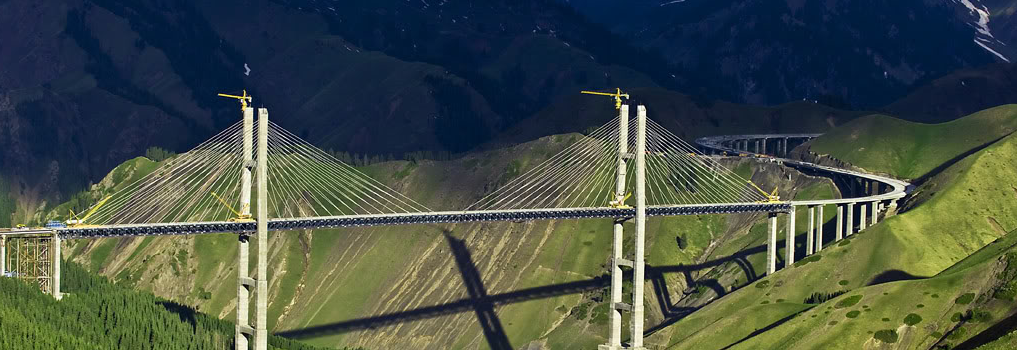China will invest a record $29.2 billion (200 billion yuan) into new highways in the troubled western region of Xinjiang, state media announced Tuesday. The massive investment is part of the government’s strategy to expand trade routes westward as well as quell ethnic unrest among the indigenous Uighur population using economic development.
According to the director of Xinjiang’s Development and Reform Commission Zhang Chunlin, the region has never seen an investment this size in its infrastructure before, China Dailyreported. Currently only one highway connects Xinjiang – which makes up one-sixth of China’s territory – to the rest of the country in the east, where the major cities are located.
The government also plans to invest 8.1 billion yuan (more than $1 billion) in railway construction and 4.8 billion yuan ($700 million) in civil aviation projects. Altogether, the investment will exceed the total funding for transportation infrastructure from 2011 to 2015, Zhang told China Daily.
Officials expect the projects to stimulate economic growth and jobs in a region that has seen increasing unrest and violence in recent years. Hundreds have died in riots, bombings and the government’s subsequent counterterrorism crackdown against those it has identified as Islamic militant separatists. Home to 10 million predominantly Muslim Uighur people, Xinjiang is resource-rich, but underdeveloped.
“How should we address the social problems that have left China’s far western region of Xinjiang vulnerable to terror threats and ethnic tension?” China’s official newspaper Xinhua wrote in 2014. “Improving the quality of living for all ethnic groups through balanced development might well be the answer.”
“As long as locals have businesses or jobs to do, they can make a living and have a promising future, instead of going down the wrong path of terrorism,” it said in another piece.
Yet amid robust development efforts and “ethnic solidarity” laws, rights groups say discriminatory policies have not subsided. Ethnic majority Han Chinese have flooded the region to claim the best new jobs, while Uighurs are cleverly weeded out by language requirements and a lack of halal dietary accommodations. Authorities have banned Muslim civil servants from fasting during the month of Ramadan, wearing “extremist” attire or participating in “illegal” religious studies. Few details are available about the counterterrorism operations, and in November, the government revoked Xinjiang residents’ passports.
“Chinese authorities have given no credible reason for taking away people’s passports, violating their right to freedom of movement,” Sophie Richardson, China director at Human Rights Watch, said in a press release. “Doing so across an entire region is a form of collective punishment and fuels resentment toward the government in a region where tensions are high.”
China vehemently denies any repression. Instead, the government is ramping up its economic strategy in the region with Tuesday’s announced $29 billion investment into roads – nearly six times the funding from last year, according to China Daily.
The transportation infrastructure plan is also necessary to achieve President Xi Jinping’s dream of a “Silk Road Economic Belt” to Eurasia and other trade corridors. Xinjiang, China’s westernmost region, would be a critical hub for future trade.
According to Zhang, the government plans to begin building 3,700 miles of highway this year, which would reduce logistical costs by 30 percent once the network is completed.
However, trade expansion may provoke already tense relations with China’s regional rival, India. Yesterday, India’s Prime Minister Narendra Modi spoke out against Beijing’s $46 billion investment into a China Pakistan Economic Corridor. The route would run from Xinjiang to Pakistan through the disputed region of Kashmir that is under Indian governance.
“It is not unnatural for two large neighboring powers to have some differences,” but both countries “need to show sensitivity and respect for each other’s core concerns and interests,” Modi said in a speech, according to Bloomberg. “Only by respecting the sovereignty of countries involved, can regional connectivity corridors fulfill their promise and avoid differences and discord.”
Source: humanosphere.org
Uighur Culture and history Uighur Tours human rights Silk Road Uighur Uighur Tours uighur people

Leave a Reply